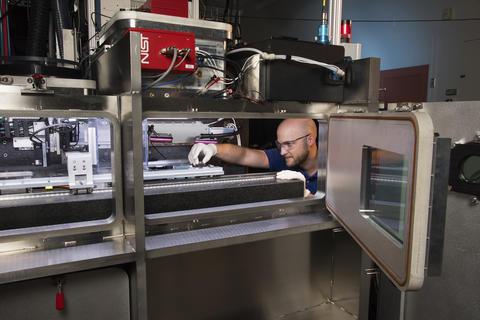- FMA
- The Fabricator
- FABTECH
- Canadian Metalworking
Our Publications
Categories
- Additive Manufacturing
- Aluminum Welding
- Arc Welding
- Assembly and Joining
- Automation and Robotics
- Bending and Forming
- Consumables
- Cutting and Weld Prep
- Electric Vehicles
- En Español
- Finishing
- Hydroforming
- Laser Cutting
- Laser Welding
- Machining
- Manufacturing Software
- Materials Handling
- Metals/Materials
- Oxyfuel Cutting
- Plasma Cutting
- Power Tools
- Punching and Other Holemaking
- Roll Forming
- Safety
- Sawing
- Shearing
- Shop Management
- Testing and Measuring
- Tube and Pipe Fabrication
- Tube and Pipe Production
- Waterjet Cutting
Industry Directory
Webcasts
Podcasts
FAB 40
Advertise
Subscribe
Account Login
Search
NIST awards $4 million to universities to study measuring methods for additively manufactured parts
- January 4, 2021
- News Release
- Additive Manufacturing

NIST mechanical engineer Brandon Lane studies a layer-by-layer 3D printing process at NIST’s Additive Manufacturing Metrology Testbed. Earl Zubkoff, for NIST
The U.S. Department of Commerce’s National Institute of Standards and Technology has awarded nearly $4 million in grants to help accelerate the adoption of new measurement methods and standards to advance U.S. competitiveness in metals-based additive manufacturing.
The following organizations will receive NIST funding, to be spent over two years:
Georgia Tech Research Corp. ($1 million). This project will analyze detailed data gathered during a powder bed fusion process to both control the process and predict the final properties of manufactured parts. The goal is to establish a comprehensive basis to qualify, verify, and validate parts produced by the technique. The initial material focused on will be on an alloy of titanium that could see extensive applications in the health-care and aerospace sectors.
University of Texas at El Paso ($1 million). This project will define a test artifact that will standardize the collection of data on the process inputs and performance of parts made via laser powder bed fusion. Academic, government, and industrial partners will replicate the artifact and collect data on the key inputs to the process and the resulting properties of the artifact for a data repository. It’s expected that the work will lead to a greater understanding of the AM process and allow for greater confidence in final parts.
Purdue University ($999,929). Qualification of parts made by AM now requires an extensive set of tests. This project aims to reduce that burden by developing a standardized approach to predict key performance properties through measurements of material microstructures and the use of mathematical models. The work promises to create a streamlined method for industry to understand part performance with less testing than is currently required.
Northeastern University ($999,464). This project aims to improve sensing approaches and create a suite of sensor technologies that will help optimize cold-spray AM. Cold-spray processes have the potential to create parts that are more durable and stronger than those made with other AM processes. New sensors will help characterize the properties of the powder feedstock and the key parameters of the process, such as temperatures and part dimensions, and allow for better control of the technique.
“By addressing important measurement challenges, these projects will improve U.S. manufacturers’ ability to use metals-based additive manufacturing to make high-quality, innovative, and complex products at high volume,” said Under Secretary of Commerce for Standards and Technology and NIST Director Walter G. Copan. “We look forward to working with these organizations to further leverage NIST experience and expertise in this key area of advanced manufacturing.”
In addition to the aforementioned awards, NIST anticipates funding additional projects in the first half of 2021.
- Podcasting
- Podcast:
- The Fabricator Podcast
- Published:
- 04/16/2024
- Running Time:
- 63:29
In this episode of The Fabricator Podcast, Caleb Chamberlain, co-founder and CEO of OSH Cut, discusses his company’s...
- Trending Articles
- Industry Events
16th Annual Safety Conference
- April 30 - May 1, 2024
- Elgin,
Pipe and Tube Conference
- May 21 - 22, 2024
- Omaha, NE
World-Class Roll Forming Workshop
- June 5 - 6, 2024
- Louisville, KY
Advanced Laser Application Workshop
- June 25 - 27, 2024
- Novi, MI
























